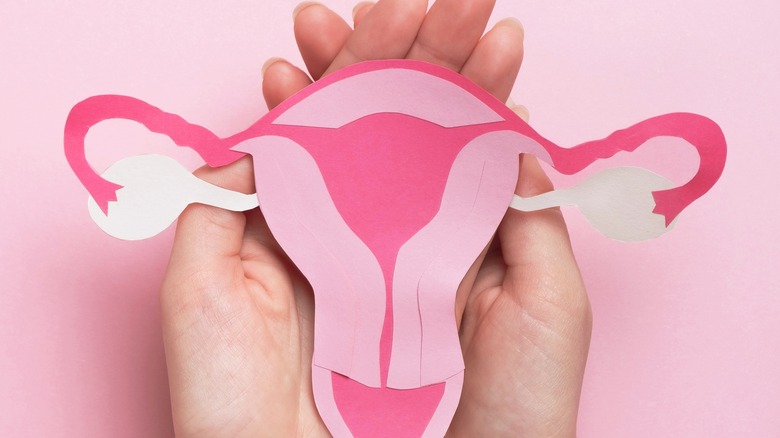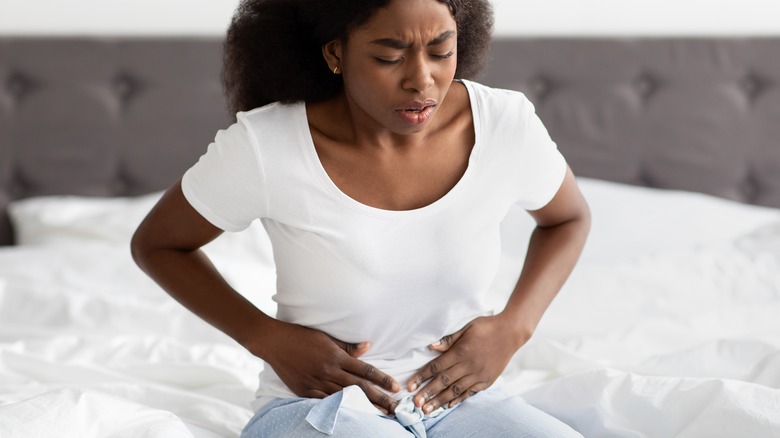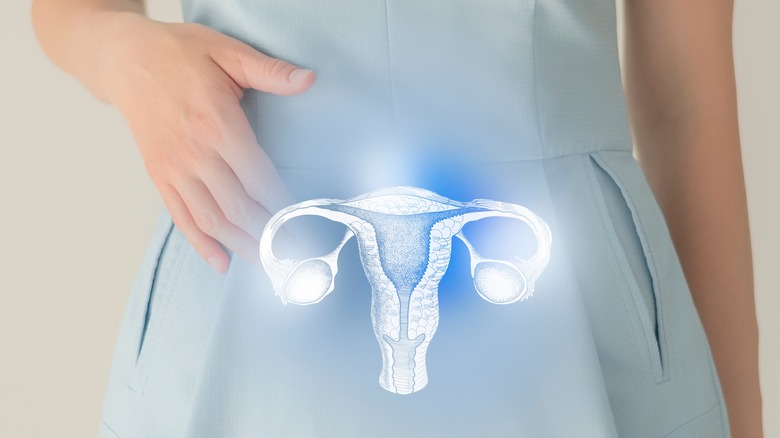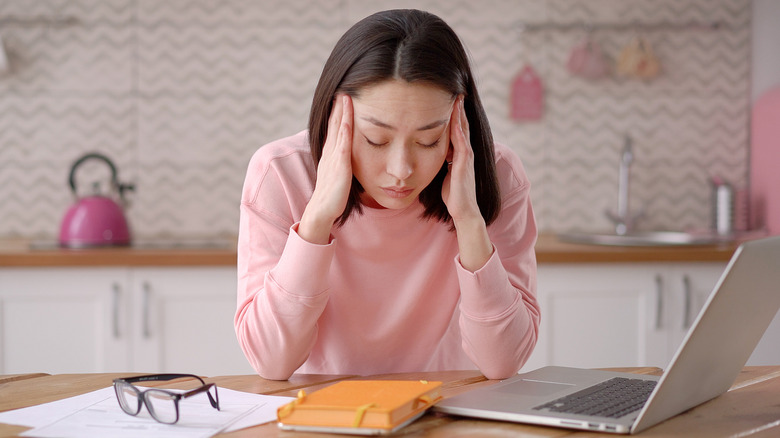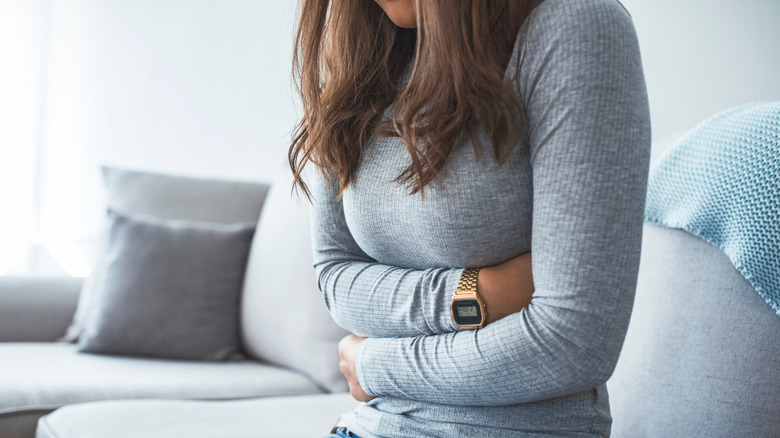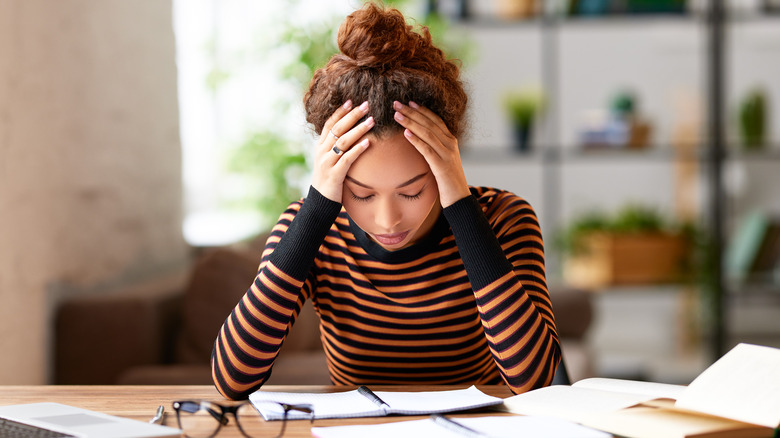Things You Might Not Know About Irregular Periods
Menstrual cycles can vary in their length and how long each phase lasts. It's hard to say what a "normal" cycle should look like, according to Planned Parenthood, because they can be different for each person. A menstrual cycle is the length between the first day of your period to the first day of your next period. Cycles can last from 21 to 35 days, but the average is around 25 to 30 days. What makes things even more tricky is that your cycle length can change from month to month.
When you get your period, bleeding can last from 2 to 7 days. Average menstrual fluid loss during that time is anywhere from 1 to 6 tablespoons. Despite the wide range of "normal" conditions that define a period, there are some warning signs that you should be aware of. The Cleveland Clinic says that periods that occur less than 21 days or more than 35 days apart could be a sign of a menstrual problem. They list other warning signs, such as bleeding that lasts longer than a week, bleeding between periods, missing three or more consecutive periods, and periods accompanied with pain, nausea, and vomiting.
There are types of abnormal periods
It's normal to have some degree of variation in the timing and duration of your period, but if it comes at a strange time or you miss it altogether, it could mean something is amiss.
There are a few ways in which your period can be irregular. For example, it could come earlier than three weeks after your last period, or more than a month later, according to the Cleveland Clinic. Another sign is missing periods. If you miss one and you're not pregnant, it's not necessarily a sign of a problem. In fact, even missing two might not be concerning. But three missed periods in a row is considered irregular. Your period could also be different in terms of the symptoms you experience. Heavier than normal bleeding could be a sign of an irregular period, as could intense cramps and stomach problems.
If the length of your period is less than two days or more than seven, it's considered irregular. Between periods, you should watch out for other possible signs of abnormality, such as random spotting and spotting after sex.
Uncontrolled diabetes can cause irregular periods
Women with diabetes who have trouble controlling it are at risk for irregular periods, says Penn Medicine. Diabetes is a condition that alters your ability to break down and remove sugar from your bloodstream, says the Centers for Disease Control and Prevention (CDC). Diabetics either have trouble producing insulin, a hormone that controls blood sugar levels, or the insulin they produce is ineffective.
Blood sugar isn't the only thing that your body has trouble regulating if you have diabetes. Penn Medicine explains that the delicate interaction between blood sugar levels and hormones in the body can be disrupted in diabetics. NYU Langone Health explains that Metformin, a drug commonly used by diabetics to control their blood sugar levels, can also help regulate an irregular period. More specifically, it's used by type 2 diabetics. Metformin helps control blood sugar levels by telling your liver to make less sugar and boosting the effectiveness of the insulin your body is already making.
Eating disorders can cause irregular periods
Similar to diabetes, eating disorders can change hormone levels in the body and make your period irregular, says Penn Medicine. Anorexia and bulimia are two eating disorders that can cause irregular or missed periods, but a study published in the International Journal of Eating Disorders explains that all types of eating disorders can cause menstrual irregularities.
It can be alarming to miss your period, but there are other health consequences that women with eating disorders face in addition to irregular menstruation. A study published in the Journal of Eating Disorders discusses some of those problems, such as a lack of bone mineral density. The authors explain that women with anorexia nervosa who miss their periods are more likely to have lower bone density. Other problems include structural changes in the brain and changes to metabolism. Thankfully, once people with eating disorders begin to return to a normal weight and menstruation comes back, many of these health problems are resolved.
PCOS can cause irregular periods
The leading cause for an irregular menstrual cycle or infertility in women is PCOS, which stands for polycystic ovary syndrome, explains Penn Medicine's Lancaster General Health. The cause of PCOS isn't certain, according to the Centers for Disease Control and Prevention (CDC), but it likely might have something to do with a class of hormones called androgens, which are found in abnormally high levels in women with PCOS.
Being overweight could have some impact on whether or not you have PCOS, but the CDC explains that it's not necessarily a cause. Genetics could play a role, so if other women in your family have it, you could be at a higher risk. Women with PCOS can develop a number of problems, including diabetes, high blood pressure, and an increased risk for stroke.
If PCOS is causing irregular periods, your doctor might suggest using birth control pills to help regulate it. Lifestyle changes can also help, such as monitoring your diet and exercising regularly.
Exercise can cause irregular periods
Exercise is generally regarded as healthy, but it's possible to push things too far. Excessive exercise is capable of causing an irregular period, according to the Eunice Kennedy Shriver National Institute of Child Health and Human Development. Another term for a disruption in your normal cycle due to an intense workout routine is exercise-induced amenorrhea. USC Fertility explains that excessive exercise combined with low body weight causes the body to enter a "starvation state."
There are certain types of workouts that make women more prone to these disruption in their menstrual cycle. Long distance running is one, says USC Fertility, because it's associated with weight loss. However, women don't have low body weights are still susceptible to disruptions from exercise. Intense workouts trigger the body to release stress hormones. Too much of these stress hormones can cause a disruption in the brain that affects how it produces reproductive hormones, which can disrupt your cycle. Women who participate in intense exercise should see a doctor if they miss a period, since it could be a sign to take things easier.
Smoking, obesity, and stress cause irregular periods
Some of the causes of irregular periods might be out of your control, but not all. Trying to live a healthier lifestyle can take care of a few of the causes of menstrual problems. A study published in BMC Women's Health found that smoking, obesity, and stress were all significantly related to irregular periods. While it can be difficult to change any one of these 3 risk factors, doing so could help regulate your period if you're experiencing issues.
Stress can affect the menstrual cycle through a change in the brain, say the authors of the study. It does so by altering something called the HPA axis, which controls stress hormones. Stress can interrupt the normal functioning of the HPA axis, which can lead to a disruption in the menstrual cycle. It's also possible that smoking alters activity of the HPA axis, mimicking the effects of stress and causing a disruption of reproductive hormones.
Uterine polyps and fibroids can cause irregular periods
Problems in the uterus can cause many issues with the menstrual cycle and even fertility. The Cleveland Clinic describes uterine polyps as growths inside the endothelium, which is the inner lining of the uterus. While these polyps usually aren't cancerous, they can cause serious disruptions in the menstrual cycle. The cause of these polyps is unclear, but hormone level inconsistencies could play a role. Signs that you might have uterine polys include irregular periods, heavy flow during menstrual cycles, bleeding between periods, and spotting or bleeding after sex.
Uterine fibroids are tumors that grow in the uterus, but like polyps, they're usually not cancerous. According to MedlinePlus, the cause of fibroids is unknown, but it could be due in part to genetics and fluctuations in hormones. It's common to develop more than one at a time, and they can be quite small or rather large. Signs of fibroids are similar to polyps, including bleeding between periods, pain during periods, and a longer period than normal.
Thyroid hormone problems can cause irregular periods
Thyroids, which are small glands located in your neck, are responsible for producing something called thyroid hormone. There are two types of thyroid hormone, T4 and T3 (per UCLA Health). Both high and low thyroid hormone levels are bad for the body. High levels can cause heart palpitations, sweating and increased body temperature, and an inability to sleep. Too little thyroid hormone can make you lethargic and lead to weight gain.
A study published in Paediatric Perinatal Epidemiology found that thyroid hormone levels played a role in the menstrual cycle, even if hormones were at a normal level. The authors explain that thyroid diseases, which can cause a fluctuation in thyroid hormone, led to disruptions in the menstrual cycle. Possible thyroid diseases, according to MedlinePlus, include hyperthyroidism and hypothyroidism, where your thyroid makes too much and too little of the hormone, respectively. You can also have swelling, lumps, or cancer of the thyroid.
1 in 5 women each year have heavy periods
Each year, an estimated 1 in 5 women in the United States experiences heavy bleeding during their periods, according to the Office on Women's Health. There are two qualifications for menorrhagia or heavy bleeding, according to the Centers for Disease Control and Prevention (CDC). The first is bleeding that lasts over 7 days. The other is having to change your menstrual pad or tampon within just two hours or passing blood clots "the size of a quarter or larger."
There are a number of possible causes of heavy bleeding that the Office on Women's Health lists. The first is problems with ovulation. If something goes wrong during ovulation, the lining of your uterus can build up and bleed heavily or unpredictably. An imbalance in hormones can also cause the lining of the uterus to bleed. Blood thinning medication can cause long or heavy bleeding, as can bleeding disorders that affect your ability to clot. Problems during pregnancy can also cause bleeding.
Heavy bleeding can cause anemia
The average amount of blood lost during menstruation is approximately 3 tablespoons, according to the UNC Department of Obstetrics and Gynecology. Bleeding over 5 tablespoons is considered "abnormally heavy," and could be a cause for concern. Although it's not necessarily indicative of a health problem, some women develop anemia if they have heavy flows. Iron supplements can help, but they may not be able to solve the problem.
Blood loss isn't necessarily a cause of anemia. Some people simply produce fewer red blood cells than they should, according to the National Heart, Lung, and Blood Institute. That could be due to a lack of iron or vitamin B12, both of which help make new red blood cells. Heavy bleeding can also cause anemia or make it worse. If you've been feeling weak, have trouble breathing, get dizzy, and have the chills, you might have anemia.
Your doctor can prescribe medicine to boost activity in your bone marrow, which is where red blood cells are developed. However, they may start by simply adding supplements to your diet or recommending foods higher in iron.
Dietary changes can help regulate periods
Women who aren't pregnant but miss their periods have a number of options to help regulate their menstrual cycle. One option is to alter your diet to increase calories and fat, according to Columbia Doctors. Increasing calorie intake is important because it can help women avoid an energy deficit. A study published in Endocrinology and Metabolism explains that there are two sides of the energy deficit equation. The first is intake, which is the amount of food you eat. Food brings calories into the body. The second side of the equation is output, which is the number of calories you burn.
Women who are in an long-term energy deficit, meaning they burn more calories than they consume, are prone to irregular periods, says a separate study published in Endocrinology and Metabolism. Whether women are too active or simply eating too little, eating more calories can help regulate the menstrual cycle.
Birth control can help regulate periods
Some women with irregular periods can benefit from taking oral contraceptives or progesterone supplements, according to Columbia Doctors. Depending on the symptoms you're experiencing, your doctor might suggest starting birth control or switching your current medication. There are different types, according to InformedHealth.org, such as combined pills and mini pills. A combined pill has estrogen and progestin, whereas the mini pill only has progestin. Both pills can help with irregular menstrual symptoms such as heavy periods.
Progesterone is an important hormone which is made in the ovaries, according to the American Society for Reproductive Medicine. Some pills use a hormone similar to progesterone to trick the body into making the lining of the uterus thinner. This can decrease the amount of bleeding that occurs during your period. Progesterone pills can also help with something called endometriosis, a painful condition where the lining of the uterus starts to grow outside of the uterus. You can control the number of periods you have per year on progesterone pills to have them monthly, quarterly, or yearly.
Oral contraceptives can cause irregular bleeding
Birth control pills can help regulate periods, but they can also cause irregular bleeding. The UNC Department of Obstetrics and Gynecology says that the most common cause of irregular bleeding may be oral contraceptives. Pills have become more advanced and the risk of irregular bleeding is less than it used to be, but it's still prevalent. Some women benefit from switching their pills or stopping them for a short period of time.
A paper published in American Family Physician explains that breakthrough bleeding from hormonal contraceptives is rarely dangerous. Bleeding is common during the first few months of use, but pregnancy and improper use of oral contraceptives can cause irregular bleeding. A possible solution to bleeding could be taking either estrogen supplements or a nonsteroidal anti-inflammatory drug (NSAID). If you're concerned, your doctor can perform an examination to see if there are other problems that might be causing irregular bleeding.
Exercise can help painful periods
If you're having cramps and discomfort during your period, the gym might be the last thing on your list of priorities. However, a study published in American Family Physician recommends exercising three times per week for 45 minutes to one hour per session to reduce pain during your period. Particularly, if NSAIDs aren't working or you simply don't want to take them, exercising can be a helpful option.
The Office on Women's Health confirms that it's safe to work out during your period. In fact, some women find themselves feeling more energetic than usual during this time. That's not always the case, though, as some women find that their energy level is low during their period, and that it increases shortly after. Either way, there's some evidence that exercise can help relieve cramps. Ultimately, your menstrual cycle shouldn't really have an impact on your workout performance.

